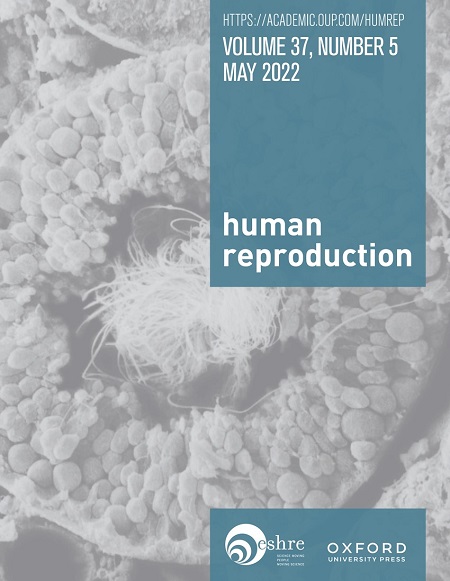P-639 Effect of preconceptional weight optimization on metabolic parameters and in vitro fertilization outcomes in infertile women with obesity
IF 6
1区 医学
Q1 OBSTETRICS & GYNECOLOGY
引用次数: 0
Abstract
Study question Does preconceptional weight loss improve metabolic parameters and IVF success rates in obese, infertile women? Summary answer Weight loss before IVF significantly improved metabolic markers, and 62.5% of those who reached target weight conceived through IVF, while 18.75% conceived spontaneously. What is known already The global rise in obesity significantly impacts female reproductive health. In Hungary, 22.7% of adult women are obese. Obesity contributes to metabolic and hormonal imbalances, negatively affecting fertility. Studies indicate that excess weight impairs in vitro fertilization (IVF) outcomes, although the benefits of weight loss remain debated. Research suggests that preconceptional weight reduction improves pregnancy rates, live birth rates, and reduces the number of IVF cycles needed. Lifestyle modification is the first-line treatment for obese, infertile women, particularly those with polycystic ovarian syndrome (PCOS). Exercise alone may also enhance fertility outcomes, as evidenced by recent clinical trials. Study design, size, duration A retrospective, single-center cohort study was conducted on infertile women with obesity (BMI>30 kg/m2) the Endocrinology Outpatient Clinic, Department of Medicine in cooperation with the Institute of Reproductive Medicine at the University of Szeged. Data collection was performed from January 1, 2020, to March 31, 2024 among women undergoing weight optimization before IVF treatment. There were no exclusion criteria for participation in the study. Participants/materials, setting, methods Comparisons of baseline clinical, laboratory, and biometric parameters of the infertile women with obesity (n = 58) were made with an age-matched control group (n = 45) with normal BMI, and within the group of infertile women (n = 16) both before and after the weight loss period, which included lifestyle modifications, dietary interventions, and liraglutide. The treatment of obesity, including pharmacological treatment, was carried out according to recent Hungarian guidelines. Primary outcomes were metabolic improvements and clinical pregnancy rates. Main results and the role of chance Infertile women with obesity (n = 58; age: 33.1 ± 5.42 years; BMI: 39.3 ± 6.90 kg/m²) had significantly higher systolic (136.8 ± 14.55 vs. 113.4 ± 13.87 mmHg; p < 0.001) and diastolic blood pressure (84.7 ± 11.98 vs. 69.4 ± 11.48 mmHg; p < 0.001) compared to controls (n = 45; age: 32.1 ± 7.67 years; BMI: 21.1 ± 2.02 kg/m²). They also exhibited a higher prevalence of metabolic disorders, including hypertension (0 vs. 17; p < 0.001), impaired glucose tolerance (0 vs. 16; p < 0.001), type 2 diabetes (0 vs. 5; p < 0.05), PCOS (5 vs. 32; p < 0.001), and hypothyroidism (0 vs. 17; p < 0.001). Laboratory tests revealed significant differences in glucose metabolism, lipid profile, liver function, and inflammatory markers. Following weight loss therapy with lifestyle and dietary changes combined with liraglutide, 16 patients reached the target weight reduction before IVF, with significant decreases in body weight (104.3 ± 16.64 vs. 89.1 ± 15.74 kg; p < 0.05) and BMI (38.5 ± 5.02 vs. 32.9 ± 5.20 kg/m²; p < 0.01). Among them, 8 conceived (5 through IVF, 3 spontaneously), 3 remained in IVF treatment, while 5 did not conceive. Limitations, reasons for caution The retrospective design, acknowledging that the program was a real-world intervention, and the small sample size limit generalizability. Variability in weight loss adherence and additional confounding factors may influence reproductive outcomes. Wider implications of the findings Preconceptional weight loss interventions could improve metabolic health and enhance fertility outcomes, potentially reducing the need for IVF in some obese, infertile women. Further research is needed to optimize strategies for weight management in reproductive medicine. Trial registration number No孕前体重优化对肥胖不育妇女代谢参数和体外受精结果的影响
研究问题:孕前减肥是否能改善肥胖不孕女性的代谢参数和体外受精成功率?IVF前减肥显著改善了代谢指标,62.5%达到目标体重的人通过IVF怀孕,18.75%的人自发怀孕。全球肥胖人数的上升严重影响了女性生殖健康。在匈牙利,22.7%的成年女性肥胖。肥胖会导致新陈代谢和荷尔蒙失衡,对生育能力产生负面影响。研究表明,超重会损害体外受精(IVF)的结果,尽管减肥的好处仍存在争议。研究表明,孕前体重减轻可以提高怀孕率、活产率,并减少所需的试管婴儿周期次数。生活方式的改变是肥胖、不孕妇女,特别是多囊卵巢综合征(PCOS)患者的一线治疗方法。最近的临床试验证明,运动本身也可以提高生育结果。研究设计、规模、持续时间回顾性、单中心队列研究在塞格德大学内分泌科门诊与生殖医学研究所合作,对体重指数(BMI>30 kg/m2)的不孕肥胖妇女进行研究。数据收集于2020年1月1日至2024年3月31日,在试管婴儿治疗前进行体重优化的女性中进行。本研究没有排除标准。研究人员将58名肥胖不孕妇女(n = 58)的基线临床、实验室和生物特征参数与年龄匹配的正常BMI对照组(n = 45)和16名体重减轻前后的不孕妇女(n = 16)进行比较,其中包括生活方式改变、饮食干预和利拉鲁肽。肥胖的治疗,包括药物治疗,是根据匈牙利最近的指导方针进行的。主要结局是代谢改善和临床妊娠率。主要结果及偶然性对肥胖不孕妇女的影响(n = 58;年龄:33.1±5.42岁;BMI: 39.3±6.90 kg/m²)患者的收缩压明显增高(136.8±14.55 vs 113.4±13.87 mmHg;p, lt;0.001)和舒张压(84.7±11.98 vs. 69.4±11.48 mmHg;p, lt;0.001),与对照组相比(n = 45;年龄:32.1±7.67岁;BMI: 21.1±2.02 kg/m²)。他们还表现出更高的代谢性疾病患病率,包括高血压(0比17;p, lt;0.001),糖耐量受损(0 vs. 16;p, lt;0.001), 2型糖尿病(0比5;p, lt;0.05), PCOS (5 vs. 32;p, lt;0.001),甲状腺功能减退(0比17;p, lt;0.001)。实验室检查显示糖代谢、脂质谱、肝功能和炎症标志物有显著差异。通过生活方式和饮食改变的减肥治疗联合利拉鲁肽,16例患者在体外受精前达到目标体重减轻,体重显著下降(104.3±16.64 vs 89.1±15.74 kg);p, lt;0.05)和BMI(38.5±5.02比32.9±5.20 kg/m²;p, lt;0.01)。其中受孕8例(体外受精5例,自然受孕3例),继续体外受精治疗3例,未受孕5例。局限性,谨慎的原因回顾性设计,承认该计划是一个现实世界的干预,小样本量限制了推广。坚持减肥的可变性和其他混杂因素可能影响生殖结果。研究结果的更广泛意义孕前减肥干预可以改善代谢健康,提高生育结果,潜在地减少一些肥胖、不孕妇女对体外受精的需求。需要进一步研究优化生殖医学体重管理策略。试验注册号
本文章由计算机程序翻译,如有差异,请以英文原文为准。
求助全文
约1分钟内获得全文
求助全文
来源期刊

Human reproduction
医学-妇产科学
CiteScore
10.90
自引率
6.60%
发文量
1369
审稿时长
1 months
期刊介绍:
Human Reproduction features full-length, peer-reviewed papers reporting original research, concise clinical case reports, as well as opinions and debates on topical issues.
Papers published cover the clinical science and medical aspects of reproductive physiology, pathology and endocrinology; including andrology, gonad function, gametogenesis, fertilization, embryo development, implantation, early pregnancy, genetics, genetic diagnosis, oncology, infectious disease, surgery, contraception, infertility treatment, psychology, ethics and social issues.
 求助内容:
求助内容: 应助结果提醒方式:
应助结果提醒方式:


